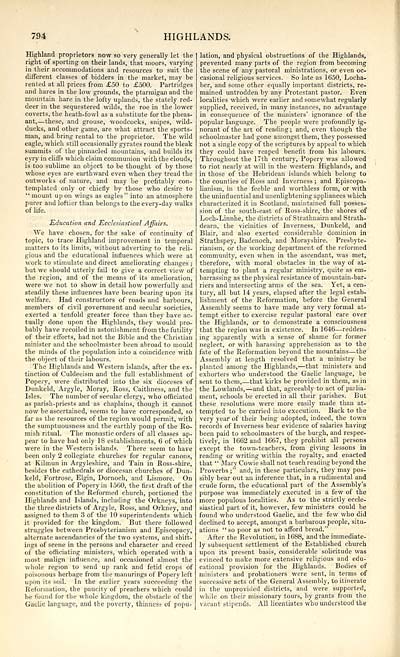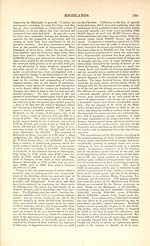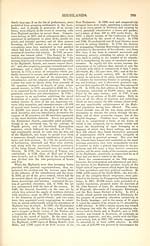Topographical, statistical, and historical gazetteer of Scotland > Volume 1
(894) Page 794 - HIG
Download files
Complete book:
Individual page:
Thumbnail gallery: Grid view | List view

794
HIGHLANDS.
Highland proprietors now so very generally let the
right of sporting on their lands, that moors, varying
in their accommodations and resources to suit the
different classes of bidders in the market, may be
rented at all prices from £50 to £500. Partridges
and hares in the low grounds, the ptarmigan and the
mountain hare in the lofty uplands, the stately red-
deer in the sequestered wilds, the roe in the lower
coverts, the heath-fowl as a substitute for the pheas-
ant, — these, and grouse, woodcocks, snipes, wild-
ducks, and other game, are what attract the sports-
man, and bring rental to the proprietor. The wild
eagle, which still occasionally gyrates round the bleak
summits of the pinnacled mountains, and builds its
eyry in cliffs which claim communion with the clouds,
is too sublime an object to be thought of by those
whose eyes are earthward even when they tread the
outworks of nature, and may be profitably con-
templated only or chiefly by those who desire to
" mount upon wings as eagles" into an atmosphere
purer and loftier than belongs to the every-day walks
of life.
Education and Ecclesiastical Affairs.
We have chosen, for the sake of continuity of
topic, to trace Highland improvement in temporal
matters to its limits, without adverting to the reli-
gious and the educational influences which were at
work to stimulate and direct ameliorating changes ;
but we should utterly fail to give a correct view of
the region, and of the means of its amelioration,
were we not to show in detail how powerfully and
steadily these influences have been bearing upon its
welfare. Had constructors of roads and harbours,
members of civil government and secular societies,
exerted a tenfold greater force than they have ac-
tually done upon the Highlands, they would pro-
bably have recoiled in astonishment from the futility
of their efforts, had not the Bible and the Christian
minister and the schoolmaster been abroad to mould
the minds of the population into a coincidence with
the object of their labours.
The Highlands and Western islands, after the ex-
tinction of Culdeeism and the full establishment of
Popery, were distributed into the six dioceses of
Dunkeld, Argyle, Moray, Ross, Caithness, and the
Isles. The number of secular clergy, who officiated
as parish-priests and as chaplains, though it cannot
now be ascertained, seems to have corresponded, so
far as the resources of the region would permit, with
the sumptuousness and the earthly pomp of the Ro-
mish ritual. The monastic orders of all classes ap-
pear to have had only 18 establishments, 6 of which
were in the Western islands. There seem to have
been only 2 collegiate churches for regular canons,
at Kilmun in Argyleshire, and Tain in Ross-shire,
besides the cathedrals or diocesan churches of Dun-
keld, Fortrose, Elgin, Dornoch, and Lismore. On
the abolition of Popery in 1560, the first draft of the
constitution of the Reformed church, portioned the
Highlands and Islands, including the Orkneys, into
the three districts of Argyle, Ross, and Orkney, and
assigned to them 3 of the 10 superintendents which
it provided for the kingdom. But there followed
struggles between Presbyterianism and Episcopacy,
alternate ascendancies of the two systems, and shirt-
ings of scene in the persons and character and creed
of the officiating ministers, which operated with a
most malign influence, and occasioned almost the
whole region to send up rank and fetid crops of
poisonous herbage from the manurings of Popery left
upon its soil. In the earlier years succeeding the
Reformation; the paucity of preachers which could
be found for the whole kingdom, the obstacle of the
Gaelic language, and the poverty, thinness of popu-
lation, and physical obstructions of the Highlands,
prevented many parts of the region from becoming
the scene of any pastoral ministrations, or even oc-
casional religious services. So late as 1650, Locha-
ber, and some other equally important districts, re-
mained untrodden by any Protestant pastor. Even
localities which were earlier and somewhat regularly
supplied, received, in many instances, no advantage
in consequence of the ministers' ignorance of the
popular language. The people were profoundly ig-
norant of the art of reading ; and, even though the
schoolmaster had gone amongst them, they possessed
not a single copy of the scriptures by appeal to which
they could have reaped benefit from his labours.
Throughout the 17th century, Popery was allowed
to riot nearly at will in the western Highlands, and
in those of the Hebridean islands which belong to
the counties of Ross and Inverness ; and Episcopa-
lianism, in the feeble and worthless form, or with
the uninfluential and unenlightening appliances which
characterized it in Scotland, maintained full posses-
sion of the south-east of Ross-shire, the shores of
Loch-Linnhe, the districts of Strathnairn and Strath-
dearn, the vicinities of Inverness, Dunkeld, and
Blair, and also exerted considerable dominion in
Strathspey, Badenoch, and Morayshire. Presbyte-
rianism, or the working department of the reformed
community, even when in the ascendant, was met,
therefore, with moral obstacles in the way of at-
tempting to plant a regular ministry, quite as em-
barrassing as the physical resistance of mountain-bar-
riers and intersecting arms of the sea. Yet, a cen-
tury, all but 14 years, elapsed after the legal estab-
lishment of the Reformation, before the General
Assembly seems to have made any very formal at-
tempt either to exercise regular pastoral care over
the Highlands, or to demonstrate a consciousness
that the region was in existence. In 1646 — redden-
ing apparently with a sense of shame for former
neglect, or with harassing apprehension as to the
fate of the Reformation beyond the mountains — the
Assembly at length resolved that a ministry be
planted among the Highlands, — that ministers and
exhorters who understood the Gaelic language, be
sent to them, — that kirks be provided in them, as in
the Lowlands, — and that, agreeably to act of parlia-
ment, schools be erected in all their parishes. But
these resolutions were more easily made than at-
tempted to be carried into execution. Back to the
very year of their being adopted, indeed, the town
records of Inverness bear evidence of salaries having
been paid to schoolmasters of the burgh, and respec-
tively, in 1662 and 1667, they prohibit all persons
except the town-teachers, from giving lessons in
reading or writing within the royalty, and enacted
that " Mary Cowie shall not teach reading beyond the
Proverbs ;" and, in these particulars, they may pos-
sibly bear out an inference that, in a rudimental and
crude form, the educational part of the Assembly's
purpose was immediately executed in a few of the
more populous localities. As to the strictly eccle-
siastical part of it, however, few ministers could be
found who understood Gaelic, and the few who did
declined to accept, amongst a barbarous people, situ-
ations " so poor as not to afford bread."
After the Revolution, in 1688, and the immediate-
ly subsequent settlement of the Established church
upon its present basis, considerable solicitude was
evinced to make more extensive religious and edu-
cational provision for the Highlands. Bodies of
ministers and probationers were sent, in terms of
successive acts of the General Assembly, to itinerate
in the unprovided districts, and were supported,
while on their missionary tours, by grants from the
vacant stipends. All licentiates who understood the
HIGHLANDS.
Highland proprietors now so very generally let the
right of sporting on their lands, that moors, varying
in their accommodations and resources to suit the
different classes of bidders in the market, may be
rented at all prices from £50 to £500. Partridges
and hares in the low grounds, the ptarmigan and the
mountain hare in the lofty uplands, the stately red-
deer in the sequestered wilds, the roe in the lower
coverts, the heath-fowl as a substitute for the pheas-
ant, — these, and grouse, woodcocks, snipes, wild-
ducks, and other game, are what attract the sports-
man, and bring rental to the proprietor. The wild
eagle, which still occasionally gyrates round the bleak
summits of the pinnacled mountains, and builds its
eyry in cliffs which claim communion with the clouds,
is too sublime an object to be thought of by those
whose eyes are earthward even when they tread the
outworks of nature, and may be profitably con-
templated only or chiefly by those who desire to
" mount upon wings as eagles" into an atmosphere
purer and loftier than belongs to the every-day walks
of life.
Education and Ecclesiastical Affairs.
We have chosen, for the sake of continuity of
topic, to trace Highland improvement in temporal
matters to its limits, without adverting to the reli-
gious and the educational influences which were at
work to stimulate and direct ameliorating changes ;
but we should utterly fail to give a correct view of
the region, and of the means of its amelioration,
were we not to show in detail how powerfully and
steadily these influences have been bearing upon its
welfare. Had constructors of roads and harbours,
members of civil government and secular societies,
exerted a tenfold greater force than they have ac-
tually done upon the Highlands, they would pro-
bably have recoiled in astonishment from the futility
of their efforts, had not the Bible and the Christian
minister and the schoolmaster been abroad to mould
the minds of the population into a coincidence with
the object of their labours.
The Highlands and Western islands, after the ex-
tinction of Culdeeism and the full establishment of
Popery, were distributed into the six dioceses of
Dunkeld, Argyle, Moray, Ross, Caithness, and the
Isles. The number of secular clergy, who officiated
as parish-priests and as chaplains, though it cannot
now be ascertained, seems to have corresponded, so
far as the resources of the region would permit, with
the sumptuousness and the earthly pomp of the Ro-
mish ritual. The monastic orders of all classes ap-
pear to have had only 18 establishments, 6 of which
were in the Western islands. There seem to have
been only 2 collegiate churches for regular canons,
at Kilmun in Argyleshire, and Tain in Ross-shire,
besides the cathedrals or diocesan churches of Dun-
keld, Fortrose, Elgin, Dornoch, and Lismore. On
the abolition of Popery in 1560, the first draft of the
constitution of the Reformed church, portioned the
Highlands and Islands, including the Orkneys, into
the three districts of Argyle, Ross, and Orkney, and
assigned to them 3 of the 10 superintendents which
it provided for the kingdom. But there followed
struggles between Presbyterianism and Episcopacy,
alternate ascendancies of the two systems, and shirt-
ings of scene in the persons and character and creed
of the officiating ministers, which operated with a
most malign influence, and occasioned almost the
whole region to send up rank and fetid crops of
poisonous herbage from the manurings of Popery left
upon its soil. In the earlier years succeeding the
Reformation; the paucity of preachers which could
be found for the whole kingdom, the obstacle of the
Gaelic language, and the poverty, thinness of popu-
lation, and physical obstructions of the Highlands,
prevented many parts of the region from becoming
the scene of any pastoral ministrations, or even oc-
casional religious services. So late as 1650, Locha-
ber, and some other equally important districts, re-
mained untrodden by any Protestant pastor. Even
localities which were earlier and somewhat regularly
supplied, received, in many instances, no advantage
in consequence of the ministers' ignorance of the
popular language. The people were profoundly ig-
norant of the art of reading ; and, even though the
schoolmaster had gone amongst them, they possessed
not a single copy of the scriptures by appeal to which
they could have reaped benefit from his labours.
Throughout the 17th century, Popery was allowed
to riot nearly at will in the western Highlands, and
in those of the Hebridean islands which belong to
the counties of Ross and Inverness ; and Episcopa-
lianism, in the feeble and worthless form, or with
the uninfluential and unenlightening appliances which
characterized it in Scotland, maintained full posses-
sion of the south-east of Ross-shire, the shores of
Loch-Linnhe, the districts of Strathnairn and Strath-
dearn, the vicinities of Inverness, Dunkeld, and
Blair, and also exerted considerable dominion in
Strathspey, Badenoch, and Morayshire. Presbyte-
rianism, or the working department of the reformed
community, even when in the ascendant, was met,
therefore, with moral obstacles in the way of at-
tempting to plant a regular ministry, quite as em-
barrassing as the physical resistance of mountain-bar-
riers and intersecting arms of the sea. Yet, a cen-
tury, all but 14 years, elapsed after the legal estab-
lishment of the Reformation, before the General
Assembly seems to have made any very formal at-
tempt either to exercise regular pastoral care over
the Highlands, or to demonstrate a consciousness
that the region was in existence. In 1646 — redden-
ing apparently with a sense of shame for former
neglect, or with harassing apprehension as to the
fate of the Reformation beyond the mountains — the
Assembly at length resolved that a ministry be
planted among the Highlands, — that ministers and
exhorters who understood the Gaelic language, be
sent to them, — that kirks be provided in them, as in
the Lowlands, — and that, agreeably to act of parlia-
ment, schools be erected in all their parishes. But
these resolutions were more easily made than at-
tempted to be carried into execution. Back to the
very year of their being adopted, indeed, the town
records of Inverness bear evidence of salaries having
been paid to schoolmasters of the burgh, and respec-
tively, in 1662 and 1667, they prohibit all persons
except the town-teachers, from giving lessons in
reading or writing within the royalty, and enacted
that " Mary Cowie shall not teach reading beyond the
Proverbs ;" and, in these particulars, they may pos-
sibly bear out an inference that, in a rudimental and
crude form, the educational part of the Assembly's
purpose was immediately executed in a few of the
more populous localities. As to the strictly eccle-
siastical part of it, however, few ministers could be
found who understood Gaelic, and the few who did
declined to accept, amongst a barbarous people, situ-
ations " so poor as not to afford bread."
After the Revolution, in 1688, and the immediate-
ly subsequent settlement of the Established church
upon its present basis, considerable solicitude was
evinced to make more extensive religious and edu-
cational provision for the Highlands. Bodies of
ministers and probationers were sent, in terms of
successive acts of the General Assembly, to itinerate
in the unprovided districts, and were supported,
while on their missionary tours, by grants from the
vacant stipends. All licentiates who understood the
Set display mode to: Large image | Transcription
Images and transcriptions on this page, including medium image downloads, may be used under the Creative Commons Attribution 4.0 International Licence unless otherwise stated. ![]()
| Gazetteers of Scotland, 1803-1901 > Topographical, statistical, and historical gazetteer of Scotland > Volume 1 > (894) Page 794 - HIG |
|---|
| Permanent URL | https://digital.nls.uk/97448274 |
|---|
| Description | Volume first. A-H. |
|---|---|
| Attribution and copyright: |
|

